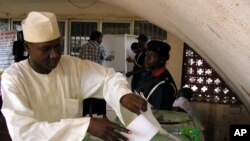Social media powered civil society groups and the Nigerian diaspora are trying to help make the country’s ongoing election process credible. Election analysts are impressed, saying such efforts will help democracy establish itself across Africa.
A video posted on the YouTube video site Thursday showed alleged rigging by election officials during last week’s legislative voting in Rivers state.
Comments below the video included the cell phone number of a top official from the Independent National Electoral Commission, known as INEC, so Nigerians worldwide could call to complain.
The video was released by a group called Juju Films Productions.
At a recent event in Washington, Reno Omokri explained the actions his Nigerian group, Council for Youth Empowerment, are encouraging.
"Go surreptitiously and just video what is happening and then upload it so that we can actually force the elections to be free and fair and credible. We are not just going to rely on INEC," Omokri said.
Omokri says Nigerians around the world have been inspired by recent social media driven uprisings in North Africa and the Middle East.
"We are actually sending youths from over here in the diaspora, also from the UK, and youths in Nigeria to monitor the election. Now you see what is happening in Egypt and Tunisia in the Arab countries. Facebook has played a major role," Omokri said.
Facebook, the social media website, has hundreds of pages dedicated to the ongoing elections. These continue Saturday with the presidential poll, and April 26 with gubernatorial voting.
Twitter, the micro-blogging website, is full of conversations preceded with so called hash tags like "Nigeria Decides."
One group of Internet Nigerian activists called "Enough is Enough Nigeria" is using both Twitter and Facebook to encourage voting, as well as discuss the process, and point out any irregularities.
With more than 70 million mobile phone lines and thousands of Internet cafes in Nigeria, as well as a very concerned Internet connected diaspora, Africa analysts say social media are helping these elections become better, a trend they are witnessing across the continent.
Peter Lewis, the director of the African Studies program at Johns Hopkins University, says more traditional civil society groups also play an important role, but now have help to be heard.
"Nigeria has always had a vibrant and diverse civil society and many groups including the Transition Monitoring Group and other organizations are very focused on this election, concerned while also hopeful and eager to play a very assertive role and a very active role in observing, documenting and indeed trying to ensure that it is a competitive and transparent exercise," Lewis said.
Dave Peterson, from the U.S.-based National Endowment for Democracy, says thousands of election observers who are becoming more and more professional are the final piece of the puzzle in making sure the elections are credible.
"If there is fraud, the world will know about it. These groups, my impression is that, they are better organized than ever," Peterson said.
Nigeria’s ambassador to the United States Adebowale Adefuye is not surprised by these developments, given the general disappointment following the last elections in 2007, which were marred by widespread violence and cheating.
"The clamor for free and fair and credible elections has been so strong since 2007 that no government dare ignore it. It is as strong as the cry for reliable source of electricity and everybody knows what I am talking about in Nigeria. The future of the country, the international image of the country, respectability of Nigerians when they leave the country is so much tied with that," Adefuye said.
Candidates in the elections have noticed as well, using Facebook and Twitter to make important announcements, and encourage more voting for them.
Nigerian Diaspora Seeks Credible Elections Using Social Media
